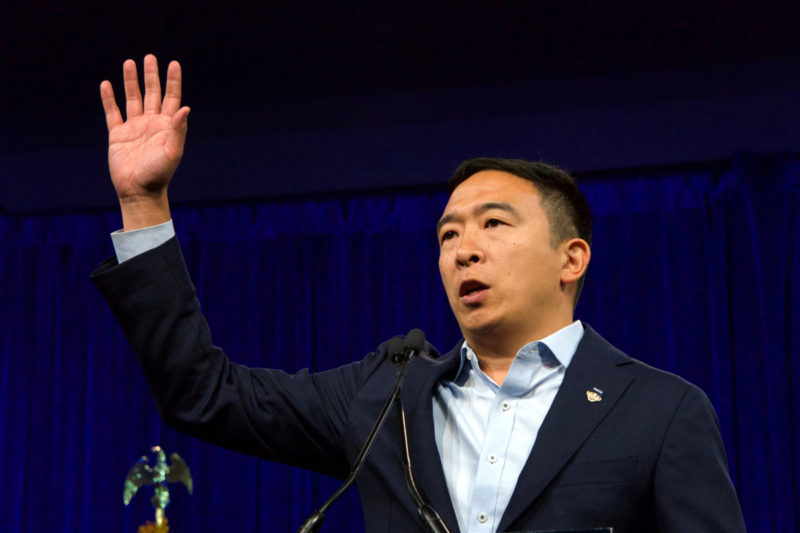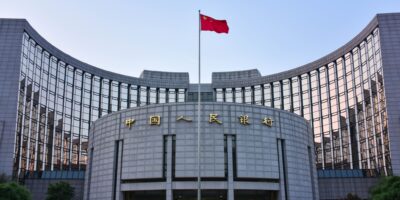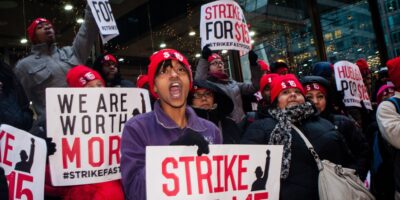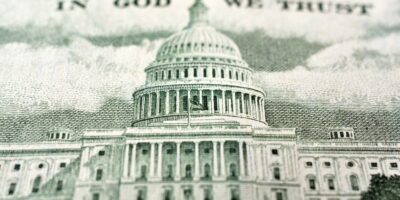We Thrive Thanks to Many Andrew Yangs, Not One

Our economy needs more Andrew Yangs. The Democratic presidential hopeful spent the better part of the last two decades as a serial entrepreneur. Some of his startup ventures were wildly successful, others failed. Going through that process over and over takes a special capacity to think both big and different and a steadfast belief in one’s ideas.
The fact entrepreneurs like Yang birth both diamonds and duds speaks to one of the bedrock principles of why we need markets — the process of many minds developing ideas and testing them competitively eclipses what one mind, no matter how brilliant, can think of in advance.
Candidate Yang is still thinking like an entrepreneur, committed to his big idea. He believes the defining problem of our generation is that increasing automation and artificial intelligence will cause millions of Americans to lose their jobs. And he’s willing to bet trillions of taxpayer dollars on a big solution, a universal basic income (UBI) of $12,000 per year for every American.
Entrepreneurs, it turns out, don’t need to understand entrepreneurship. The same creativity that led Yang to create value in our economy now leads him astray, because there’s only one president. And there are big problems with Yang’s disruptive idea.
Ganging Up
A few weeks ago I had a memorable introduction to the Yang Gang, the candidate’s relentlessly enthusiastic online supporters. On Twitter, I wrote that:
When @AndrewYang fears an automation crisis, he makes two mistakes. 1) he extrapolates a highly uncertain trend (machines replacing workers) decades forward while 2) imagining the rest of the world as it is today
Needless to say, the Yang Gang disagreed. I received dozens of comments, often intense and emphatic, but also substantive and civil. That isn’t the norm when politics and social media collide, and it says a lot about the Yang campaign and Yang himself.
One of the gang sent along a McKinsey report on automation and asked me to read it. Yang uses the report to back up his rather dire statements about automation, which in turn motivates his UBI. This is basically his elevator pitch, and like many good entrepreneurs, he doesn’t let the facts complicate his big idea.
Yang’s website states that “⅓ of American workers will lose their jobs to automation by 2030 according to McKinsey.” The only mention of “one third” I find in the McKinsey report is when they predict jobs displaced by automation at the county level:
Job losses will occur nationwide. In 90 percent of US counties, the potential displacement rate is between 22 and 27 percent. But there are variations, ranging from 18 percent all the way to 33 percent in some hard-hit places.
Perhaps I’ve missed something, and if the Yang Gang can explain what I’ll happily add a retraction in this space. If I’m correct, the campaign should update its claim. For starters, replace a third with a quarter, though further unpacking the report reveals deeper problems with the candidate’s idea.
Innovation Happens
If the word “displacement” in McKinsey’s result stands out to you, it’s their projected estimate of the raw number of jobs lost. The bulk of the report is concerned with net job growth — in other words subtracting those lost jobs from their projections of growth from industries like health care and technology and, yes, jobs created by automating other work.
The results are predictable but important. More high-skilled jobs clustered in urban areas, fewer unskilled jobs in rural and economically depressed areas. Should McKinsey and Yang’s predictions about automation come to pass, it will be the second wave in an even bigger trend — the shift toward higher-skilled jobs in the U.S. economy.
In the first wave, globalization and information technology conspired to shift us from a manufacturing to a service economy. Manufacturing jobs peaked in 1979 at over 19 million — today that number (which has rebounded slightly) is just short of 13 million.
A loss of almost seven million factory jobs along with a 45 percent increase in population during those 40 years sounds downright apocalyptic when taken out of context. But consider that beyond the ups and downs of business cycles, the number of unemployed Americans 40 years ago was just above six million, and today is just below that same number. Booms and busts have caused big changes in that number along the way, but nothing indicates structural change in our economy.
Millions of factory workers laid off, almost 50 percent more mouths to feed, and no change in the number of jobless? What happened? In part, millions of Andrew Yangs happened. At the intersection of innovation and competition, they gave us opportunities beyond anyone’s wildest dreams. Why would they stop now?
The shift to higher-skilled labor has caused significant upheaval, and is probably the main force behind the election of our current president. Drive an hour from AIER’s offices to Springfield, Massachusetts, and it’s easy to see too many people aren’t benefiting from all these innovative ideas. I’m all for replacing our current welfare system with something that looks like Yang’s UBI for those who really need it.
But basic income, whether universal or means-tested, won’t solve the problems we see in Springfield or much of rural America. Only the mighty evolutionary force of entrepreneurship — both in the market and increasingly, I hope, in the philanthropic world — will change that.
There are many, many worse choices for president than Andrew Yang. He and his supporters approach their campaign with substance rather than scapegoating, and he clearly has respect for the entrepreneurial system that made him who he is. But the defining question we face isn’t how to take care of people left behind by innovation, but rather how to let that innovative process ignite for them as well.










